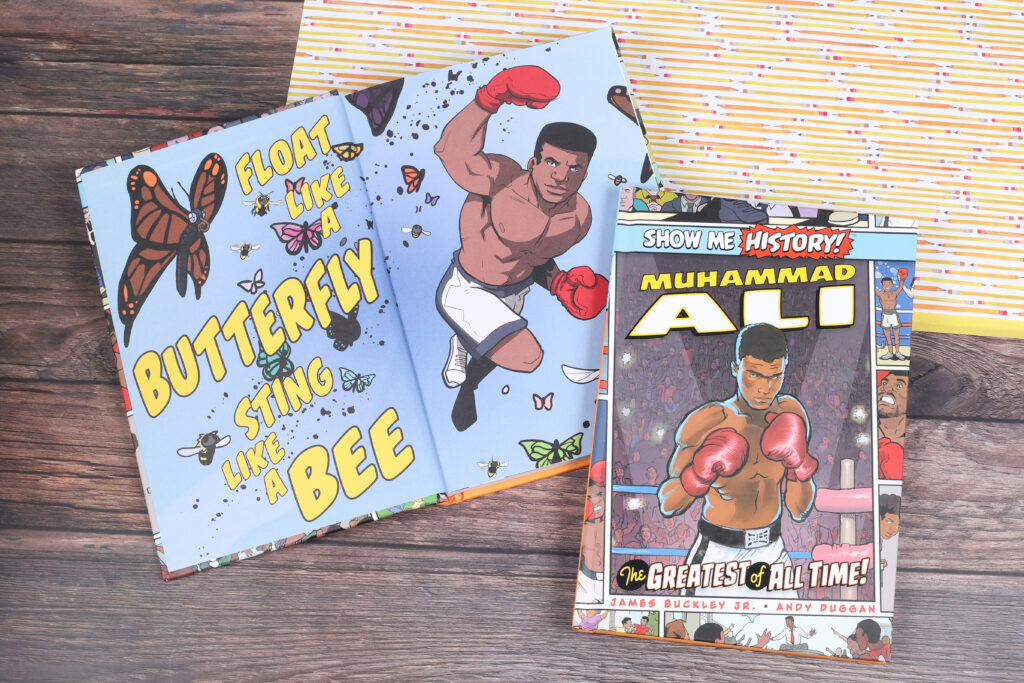Sixty-two years ago one of the most astonishing, memorable, and important athletes and cultural figures debuted on the world stage when Cassius Clay won a gold medal in boxing at the 1960 Olympics. Read on to learn about “The Greatest,” Muhammad Ali, and check out his book in our Show Me History series, Muhammad Ali: The Greatest of All Time!
Before he was Muhammad Ali, he was Cassius Clay
He adopted the name of his choosing in the mid-1960s after joining the Nation of Islam. “Cassius Clay is a slave name,” he told reporters. “I didn’t choose it and I don’t want. I am Muhammad Ali, a free name. It means beloved of God.” He settled on Muhammad Ali after first announcing that he wanted to be called Cassius X, a reference to his friend and religious advisor, Malcolm X.
People's Champion
At his peak in the 1970s, Muhammad Ali was arguably the most famous and most popular athlete in the world. He could count among his fans even a few people even more well-known than he was. Pope John Paul II once asked Ali for an autograph, and Elvis Presley gifted the boxer a white robe with “People’s Champion” embroidered on the back. (It cost Elvis $10,000.)
Starring As Himself
In 1977, Hollywood made a Muhammad Ali biopic, based on the athlete’s autobiography, The Greatest: My Own Life Story. And who could possibly bring justice to the role of one of the most unforgettable and charismatic people of all time than Ali himself? The Greatest, the life story of Muhammad Ali, starred Muhammad Ali as Muhammad Ali. It covers his life from the 1960 Olympics to 1974’s “Rumble in the Jungle,” his fight with George Foreman in Zaire.
Superman vs. Muhammad Ali
The boxing ring and the big screen still weren’t enough to contain Ali and his energies. In 1978, he took on Superman. The comic book Superman vs. Muhammad Ali found Clark Kent interviewing the boxer when he’s teaching kids to play basketball. Then an alien invades Earth, threatens Superman to a fight, but Ali wants to take on the aliens, so he challenges Superman for the right to beat up the aliens.
Ali Gave Back
His various charities fed 22 million people over the years, and in 1981, when the city of Atlanta was on the verge of bankruptcy due to spending a fortune on hunting a serial killer (the “Atlanta Child Murderer”), Ali donated $400,000 to the reward fund. He’d later light the Olympic torch heralding the start of the 1996 Summer Olympics in Atlanta.
One Night in Miami
When Muhammad Ali died on June 3, 2016, at the age of 74, the news first broke in a most unlikely place and method. As a Miami Marlins home game wrapped up and fans filed out of Marlins Park, the digital scoreboard displayed a photo of Ali with the caption “1942 to 2016.” Photos of the board hit Twitter, and news outlets picked up on that, soon confirming the story, and more than two hours later, Ali’s family confirmed that the Greatest had died of a respiratory issue. The Marlins knew before anyone, because as team president David Samson later explained, Ali was a friend of the franchise, and a relative told the Marlins first.
To learn more about the remarkable life of the boxing champion and civil rights organizer, read Muhammad Ali: The Greatest of All Time! It’s part of Portable Press’s “Show Me History!” series of graphic novels about historical heroes and trailblazing figures.








